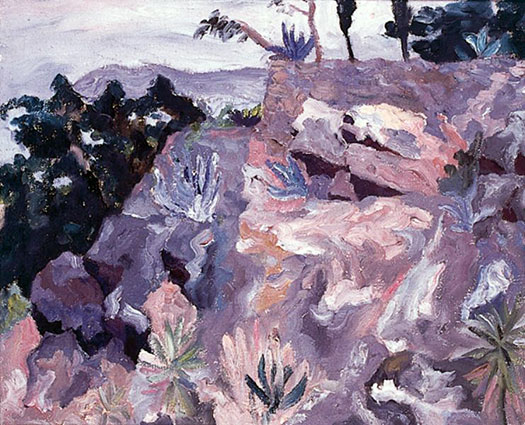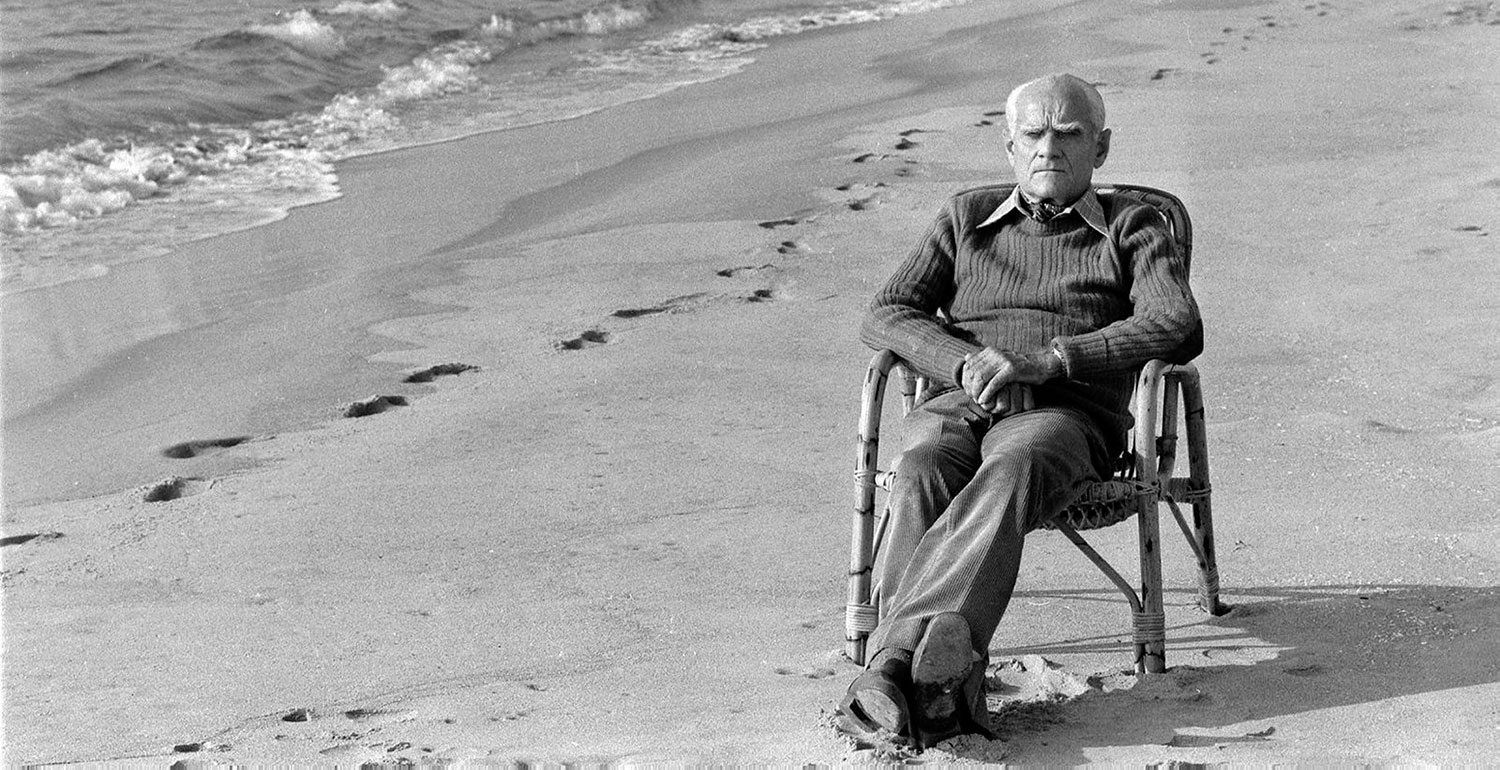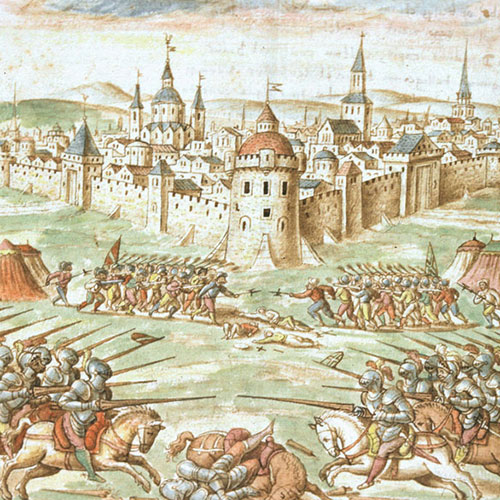November 2015
self-fulfilling
1 November 2015, around 10.13.

In the middle of too many projects. Work projects, personal projects, web projects, textile projects, reading projects. Everything is – or rather has become – a project, mostly because I am too lazy to try to think of another way of thinking about things. So I am left with these projects, which given my laziness I am unlikely to complete – or at least unlikely to complete in any span of time which might sustain the illusion that the set of discrete actions which I have embarked upon (reading a page, knitting a row) form a coherent, intentional whole.
I am left, then, with partial projects; or rather, the never to be entirely completed parts of an idea that was itself never fully formed. If it were not so distracting, it would almost be satisfying.1
- The initial image is one of Henry Fuseli’s sketches, which I found when I was looking for something else. [↩]
mistaken identity
2 November 2015, around 17.15.

I have often wondered why there is such a feeling of desolation in English cafés. Perhaps it comes from their desolate social relationships. Every place where the English gather to chat to one another exudes melancholy. Indeed, nothing in the world is sadder than an English conversation, in which everyone is careful to keep to superficialities and never touch on anything essential. In order not to offend your neighbor, not to violate his privacy – which is sacred – an English conversation revolves around subjects that are extremely boring for everyone concerned, but in which there is no danger.
I’m not quite sure why I put every book I could find by Natalia Ginzburg on hold at the library. Nor do I know what I was expecting to find, as I can’t recall any recent article or review or passing mention to spur my interest. (Of course I am perhaps forgetting the copy of Yevgenia Ginzburg’s Journey into the Whirlwind picked up at the library book sale.) The copy of The Little Virtues was pleasing: well read, but not abused – no ignominious marginalia. It is comforting to come across a library book like this, to feel in the company of other silent, nameless readers. It helped, of course, that the essays charmed: I did not find them ‘whiny’; rather, they captured the same sort of brutal melancholy one finds in Carlo Levi’s Christ Stopped at Eboli (a thrift store staple) or Nadezhda Mandelstam’s Hope Against Hope – for obvious reasons, I suppose.1 Ginzburg’s essays are neat, but not facile, and explore tender areas, for especially for those ‘who staggered from laziness to frantic activity and back again, wasted our time trying to decide whether we were lazy or industrious’ (15). A fortuitous accident, then, in requesting them.
- I am of course leaving something out in not discussing the politics involved – it is a willful omission. [↩]
Montaigne 1.43
6 November 2015, around 10.25.
The linking of sumptuary laws and fear of change, and the need for those in power, for those with influence, to teach ‘people’ how best to live.
And albeit most men were apparreled alike, yet were there other sufficient apparant distinctions of mens qualities. How soone doe plaine chamoy-jerkins and greasie canvase doublets creepe into fashion and credit amongst our souldiers if they lie in the field? And the garishnesse, neatnesse, and riches of silken garments grow in contempt and scorne? Let Kings first begin to leave these superfluous expenses. We shall all follow, and within a moneth, without edicts, ordinances, proclamations, and acts of Parliament, it will be observed as a law. The statutes should speake contrarie, as thus: That no man or woman, of what qualitie soever, shall, upon paine of great forfeitures, weare any manner of silke, of scarlet, or any goldsmiths worke, except only Enterlude-players, Harlots, and Curtizans (trans. Florio).
This might work – assuming people do not decide they would rather be ‘enterlude-players’ or, as Trechmann translates it – ‘mountebanks’.
Citation (52)
12 November 2015, around 15.47.

For me, boredom is not the opposite of amusement; I might even go so far as to say that in certain of its aspects it actually resembles amusement inasmuch as it gives rise to distraction and forgetfulness, even if of a very special type. Boredom to me consists in a kind of insufficiency, or inadequacy, or lack of reality. [….] The feeling of boredom originates for me in a sense of the absurdity of a reality which is insufficient, or anyhow unable, to convince me of its own effective existence. For example, I may be looking with some degree of attentiveness at a tumbler. As long as I say to myself that this tumbler is a glass or metal vessel made for the purpose of putting liquid into it and carrying it to one’s lips without upsetting it – as long as I am able to represent the tumbler to myself in a convincing manner – so long shall I feel that I have some sort of relationship with it, a relationship close enough to make me believe in its existence and also, on a subordinate level, in my own. But once the tumbler withers away and loses its vitality in the manner I have described, or, in other words, reveals itself to me as something foreign, something with which I have no relationship, once it appears to me as an absurd object – then from that very absurdity springs boredom, which when all is said an done is simply a kind of incommunicability and the incapacity to disengage oneself from it. But this boredom, in turn, would not cause me to suffer so much if I did not know that, although I myself have no relationship with the tumbler, such a relationship might perhaps be possible, that is, because the tumbler exists in some unknown paradise in which objects do not for one moment cease to be objects. For me, therefore, boredom is not only the inability to escape from myself but is also the consciousness that theoretically I might be able to disengage myself from it, thanks to a miracle of some sort.
Montaigne 1.44
13 November 2015, around 8.34.
What, then, is sleep? And what, if any, are its virtues? A sound sleep the sign of both exhaustion and courage.
The knowledge we have of this mans unmated-haughty heart by the rest of his life, may make us judge with all securitie that it only proceeded from a spirit so far elevated above such accidents that he dained not so much as to trouble his minde with them no more than with ordinarie chances (trans. Florio).
Crambe repetita (41)
15 November 2015, around 12.26.
The parks appear in the city like lakes – your eyes rest there, refreshed and at ease, cleansed of soot.
Because wherever the city is not green it is quickly smothered in a thick blanket of soot and smells like a railway station – of old trains, dust and coal.
The railway stations are the places where England is most openly gloomy. Scrap iron piles up there and coal dust and heaps of rusting, tangled, disused rails. They are surrounded by desolate little allotments full of cabbages, where bits of underwear are hung out to dry and where there are sheds patched together like old sheets.
Montaigne 1.45
20 November 2015, around 7.16.

There is little one can take away from Montaigne’s account of the battle of Dreux other than being glad one was not there – and that quibbling about managerial decisions has been a (justified) habit from time immemorial.
Montaigne 1.46
27 November 2015, around 8.09.
This vocal and auricular correction, and so full of devotion, strucke right unto his soule. This other following, of the same kind, insinuated it selfe by the corporall senses. Pythagoras being in companie with two young men, whom he heard complot and consult (being somewhat heated with feasting and drinking) to go and ravish a chast-house, commanded immediately the minstrels to change their tune; and so by a solemne, grave, severe, and spondaicall kinde of musicke, did sweetly inchaunt, allay, and in-trance their rash, violent, and law-lesse lust.
* * *
Paulo post esse ferunt nuntiatum Simonidi, ut prodiret; iuvenis stare ad ianuam duo quosdam, qui eum magno opere evocarent; surrexisse illum, prodisse, vidisse neminem: hoc interim spatio conclave illud, ubi epularetur Scopas, concidisse; ea ruina ipsum cum cognatis oppressum suis interisse: quos cum humare vellent sui neque possent obtritos internoscere ullo modo, Simonides dicitur ex eo, quod meminisset quo eorum loco quisque cubuisset, demonstrator unius cuiusque sepeliendi fuisse; hac tum re admonitus invenisse fertur ordinem esse maxime, qui memoriae lumen adferret.
